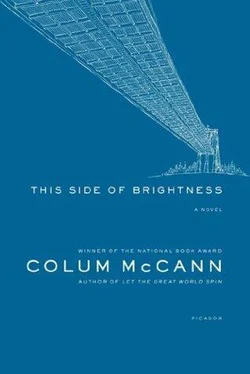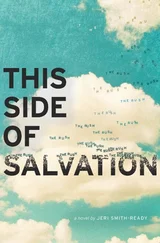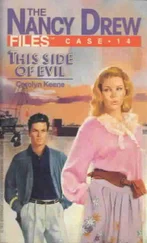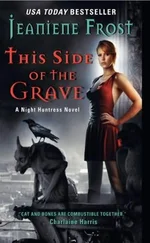Looking down at the spinning gravel at his feet, Clarence imagines his mother coming home with the laundry as she was supposed to do. In the vision, she sits on the sofa beside her grandson and jokingly puts a finger in the child’s belly button. Then she goes back across the room to the kitchen, where she removes the cosy from the pot and pours herself a cup of tea. She drops the sugar cube in and lets the spoon whirl and says, “Ahhh, now that’s the medicine.” She brings the steaming cup across the room and sits on the edge of the chair and, smelling of tea leaves, she leans over her grandson and says, “He’s the cutest thing I’ve ever seen.”
Clarence lets the vision drift with the miles — grain elevators, smoke from slag heaps, whitewashed farmhouses.
He reaches Brookwood Station in Atlanta the following day, wanders way beyond Peachtree Street. The city is a conundrum of highways and overpasses. Sapped of all energy, he stumbles along, feet slapping languidly through puddles. On the outskirts of the city, a new concrete ramp reaches out into empty air. Men work on the ramp, dangling on ropes in midair. He watches their antics in the rain, then raises his head, sees the sun break out behind dolorous clouds.
In the afternoon he finds a Laundromat off Hunter Street, and the dark-skinned manager lets Clarence sit in the bathroom in his underwear until his clothes are ready. There is a newspaper on the floor. He picks it up. On the front page there is a report of a fourteen-year-old lynched in Greenwood, Mississippi, for whistling at a white woman. Maybe the boy whistled and maybe he didn’t. Maybe his body is still whistling. Maybe he will whistle forever. The face stares out at him from the newspaper, and Clarence’s hands shake.
After an hour the Laundromat manager hands his clothes around the door. Clarence finds the blood stains have left small copper patches on his dungarees. Dressed, he gazes long and hard at himself in a cracked mirror, then wanders across the street to a barbershop where a red-and-white pole swirls merrily. He gets his hair shorn down to the scalp and the black barber says to him, “There ya go, bud, good as new.”
Clarence looks at himself in the barber’s mirror. “Shave me,” he says.
The hot wet towel is placed on his neck and the cream is lathered on. The razor feels cool against his throat. He imagines it going deeper and deeper into his neck, right down to the tendons and the veins and beyond — when the veins are open and deep, his baby boy will swim down into his bloodstream, his groin, his brain, his heart.
The towel grows cool as the razor slides.
“Even better’n new,” says the barber, scraping the side of the razor on the hip pocket of his apron. Clarence leaves a small tip and wanders on, looking at his reflection in shop windows, seeing a person he doesn’t want to be.
Later that week, in the main post office on Forsyth Street, he searches for his own face on the WANTED posters but sees only the eyes of other men, all of them dark and grim, expectant of death. He walks the city streets of Atlanta, weeping.
* * *
Four policemen stand in Walker’s room as he sits holding Louisa’s hand. Louisa is shaking. She hugs her baby high, hiding a milk stain on her dress. Maxine and Deirdre lie sobbing on the beds.
“So,” says one of the cops, “where d’you think he might go?”
“No idea.”
“He won’t get too far with one messy eye. Not too many men running around with eye patches. You listening, Walker?”
“Mister Walker to y’all.”
“Where is he?”
Walker looks at the ceiling and remembers himself in the canoe when young, moving beneath the cypress trees that blocked out most of the summer light, reaching up to grab Spanish moss, his gnarled paddle making long swishes in the water, a silence to his movement, a quiet intent, a slight twist of the wrist at the end of each stroke to redirect the canoe, the paddle barely making a splash, bending himself into the work of repetition, the moss coming away softly in his fingers, the Okefenokee screaming around him.
The cop leans over and stares in Walker’s face. “We need you to tell us where you think your son might go. He’s in a high heap of shit.”
“Is he now?”
“We can help him.”
“I bet you can.”
“You’re asking for it, old man.”
Walker remembers rounding a corner, holding a flaming branch with the resin burning, seeing a huge sweep of white in the night air, a whole flock, and a solitary sentinel at the edge of the swamp, not moving.
“If you find out, you better tell us. It’s for his own good.”
“Sure it is,” says Walker.
“Don’t get smart with me, old man.”
A poisoned silence floats through the room.
“Where the hell is he?”
“I’d say he’s probably done made his way to California. He was always talking about California. Ain’t that right, Louisa?”
“That’s right,” she says.
“Little town by the name of Mendicino, I believe. He was always talking about Mendicino. Don’t know what it is attracted him there. But he was always yapping on about Mendicino. Sun and waves. He was partial to the idea of sun and waves.”
“Gonna get himself a suntan, was he?”
“I’m not rightly sure he needs a suntan.”
“California?”
“That’s where he’ll be.”
The cop moves toward the door. “I know you’re lying.”
“Don’t hurt him,” says Walker. “If you hurt him I’ll hurt you back. That’s a promise.”
“I’d say that’s a threat.”
“Don’t hurt him,” Walker says again. “Please don’t hurt him.”
* * *
Three weeks after the cops’ visit, Walker borrows fifty dollars from Rhubarb Vannucci and takes a train down to Atlanta, where the police have found Clarence.
Walker bends his big frame into the heat, finds himself sipping at a water fountain marked Colored. Trees are in blossom all over the city. Febrile grackles sing out loudly on the branches. Women in pastel hats shade their faces from car fumes. Just outside the train station, he sees a young boy shining shoes. The boy looks up at him and smiles. Walker tries hard to remember where he has seen the boy before, but can’t.
He walks, swinging his shoulders solidly, unwilling to telegraph his grief.
Mosquitoes seem to gather in prayer outside the window of his hotel room. The heat is unbearable, and he opens the window. The insects swarm in, congregate around him. He squashes a few of the mosquitoes, and a little smudge of blood is left on his fingers. A welt swells up beneath his eye. Standing at the window, his sight is fuzzy: trees make shapes and a bar sign blurs. He leaves the hotel and goes across to the bar, orders a shot of whiskey. A sultry jazz singer looks at him from a stage, moves a pink tongue around her lips salaciously. Walker all of a sudden remembers the face of the boy shining shoes at the train station and realizes that he might have been looking at himself when young. He puts his face into the cups of his hands, knocks over the full whiskey, shoves his way out into the night.
Staggering across the street, he claps a flying moth. He flicks the remnants of dust off the palms of his hands. A threadlike antenna remains on his palm and he blows it off, remembering another moth in a different room months ago.
In the morning he wakes to birdsong and makes his way to the mortuary. Not even the hands of the morticians can disguise the beating Clarence must have received, his jaw slopped sideways, his cheekbones bloated blue with bruises, a new eye-patch over an even deeper wound in the socket. The police tell him that Clarence was shot dead while trying to escape through a junkyard on the outskirts of the city. Clarence, they say, robbed a liquor store at knifepoint and ran into the yard to take cover, was shot as he slipped on oil drums. The knife was recovered at the scene, and Clarence’s pockets were stuffed with money.
Читать дальше












